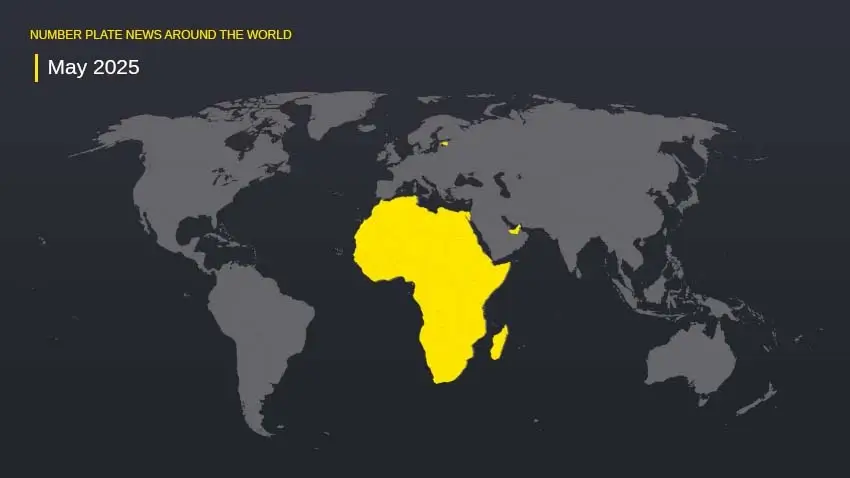Lagos plates to recognise disability
The Lagos State Number Plate Production Authority (LSNPPA) in Nigeria has announced plans to launch number plates which will identify and recognise people living with disabilities.
Details are sparse, but Oluwaseun Osiyemi, Lagos's state Commissioner for Transportation announced the new plates at the 2025 Ministerial Press Briefing. Mr Osiyemi said that the initiative was in line with the government's THEMES Plus Agenda on inclusion.
In an overview of number plate related matters, Mr Osiyemi summarised the work done by LSNPPA over the last year.
The LSNPPA functions as the manufacturing arm of the state government and is responsible for producing vehicle number plates for Lagos State. It produced 218,400 standard number plates for both private and commercial vehicles.
In the last two decades, LSNPPA's operations have expanded to also include production of aluminum-based road furniture, advancing the state’s infrastructure development goals.
LSNPPA is also responsible for producing customised plates that can be provided on request to the state's vehicle owners.
Mr Osiyemi addressed the issue of number plates fading and emphasised that plates should be changed when they become faded. He observed that number plates have a finite lifespan, just like people.
Dubai auction generates record revenue
An auction held on Saturday 26 April 2025, at the Grand Hyatt Dubai hotel generated a record-breaking total revenue of Dh98.83 million, which converts to about £20,089,706 GBP. The sum broke previous revenue records set by previous auctions. Dubai’s Roads and Transport Authority (RTA) auctions are very popular and are known for their transparency, equal opportunity, and symbolic value for plate collectors and enthusiasts.
Top performer on the evening was the number CC 22, which achieved Dh8.35 million. In second place was BB 20, which sold for Dh7.52 million. Third place went to BB 19 at Dh6.68 million. Other strong showings came from AA 707 at Dh3.31 million and AA 222 at Dh3.3 million.
In addition to bidders who attended the auction in person, participants were able to take part by registering on RTA’s website or with its mobile app. Eligible bidders were required to hold a valid Dubai traffic file and to submit a Dh25,000 security cheque, along with a non-refundable registration fee of Dh120. VAT at 5% was applied to all sales.
The selling price of Dh8.35 million (£) places CC 22 27th in Regtransfers' table of the most expensive number plates sold in the world.
The next RTA auction will be an online event including 350 exclusive plates. The online auction will go live on Monday, 26 May.
Estonia's ANPR network raises privacy concerns
Estonia's Police and Border Guard Board operates a network of over 200 automatic number plate recognition cameras across the country capturing over 20 million images of vehicles per month.
Estonian law initially permitted ANPR on Estonia's borders, but the network soon began to gradually grow. The head of the Northern Prefecture's Criminal Bureau has said that the police currently have 250 number plate recognition cameras at their disposal, 228 of which are operational.
Roger Kumm said "We primarily use this system for serious investigations and saving lives."
However, the ANPR system has never been publicly debated in Estonia, and concerns have been raised by lawyers and politicians.
Indrek Sirk, an attorney-at-law and member of the government's traffic commission said that he did support the principle of average speed monitoring, but added that it is essential to clearly define the rules under which license plates are photographed and how data is deleted for vehicles that are not found to have exceeded the speed limit.
Justice Minister Liisa-Ly Pakosta expressed similar thoughts. While she does not rule out the legitimacy of such a system, the minister emphasized that people must have a say in the implementation of such surveillance.
New number plates for Ethiopia
Ethiopia’s transport ministry has announced that it will introduce new standard number plates for all vehicles in the country. The ministry said the current system is vulnerable to counterfeiting, bad governance and crime.
The new system will have plate numbers with “ETH” in Roman letters, but also in Ge'ez characters. Ge'ez is an ancient language of the region, with its own script.
The new plates will have "security features for monitoring and inspection purposes".
They will also indicate the kind of service that a vehicle provides and the type of energy used to power it. Electric vehicles, for example, will have a different plate number from vehicles that consume petroleum fuels.
